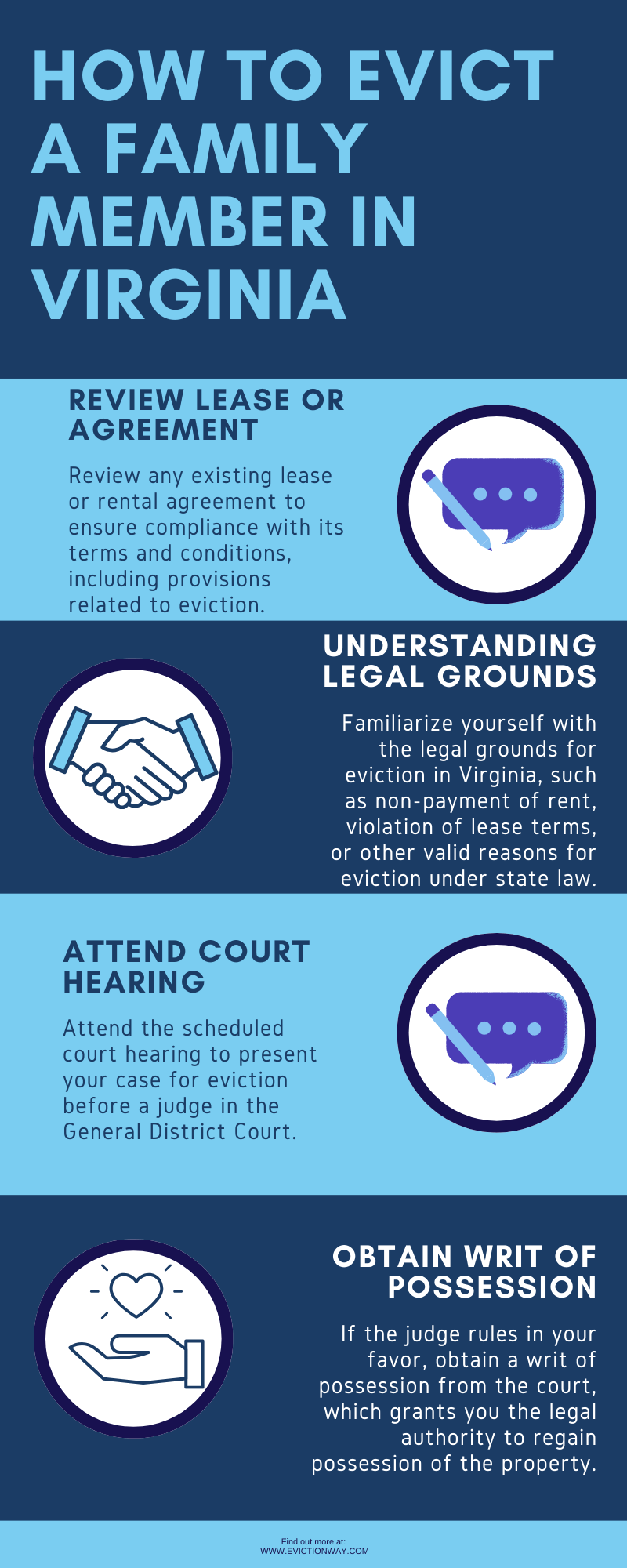Evicting a family member can be a difficult and emotional process, but it may be necessary to protect your rights and property. If you’re facing this situation in Virginia, this blog article will provide you with the information you need to know.
We’ll share the best way to evict a family member in Virginia, including the legal process and the steps you need to take. We’ll also provide tips on removing a family member politely and respectfully, and we’ll discuss the laws involved and any legal tips you should keep in mind.
Whether you’re dealing with a difficult family member who has overstayed their welcome or a situation that has become unsafe or uncomfortable, this article will provide you with the guidance you need to navigate this challenging process.

How To Evict a Family Member In Virginia
Evicting a family member can be a difficult and emotional process. However, it is important to remember that you have the right to protect your property and your well-being. If you are considering evicting a family member, it is important to follow the proper legal procedures.
1. Give Notice
The first step in evicting a family member is to give them written notice. The notice must state the reason for the eviction and the date by which the family member must vacate the property. The notice must be served in person or by certified mail.
2. File a Complaint
If the family member does not vacate the property by the date specified in the notice, you will need to file a complaint with the court. The complaint must state the facts of the case and the relief you are seeking.

3. Serve the Complaint
Once you have filed a complaint, you will need to serve the family member with a copy of the complaint and a summons. The summons will inform the family member of the date and time of the hearing.
4. Attend the Hearing
At the hearing, you will have the opportunity to present your case to the judge. The family member will also have the opportunity to present their case. The judge will then make a decision based on the evidence presented.
5. Obtain a Writ of Possession
If the judge rules in your favor, you will be issued a writ of possession. The writ of possession will order the family member to vacate the property. If the family member does not vacate the property by the date specified in the writ of possession, you can have the sheriff remove them from the property.
6. Get Legal Help
Evicting a family member can be a complex and challenging process. It is important to seek legal help if you are considering evicting a family member. An attorney can help you understand your rights and protect your interests.
Additional Resources for Virginia eviction help:
Eviction notice Virginia
In Virginia, Eviction notice indeed serves as a legal document that landlords can utilize when tenants breach their lease agreements.
This notice essentially notifies tenants to vacate the premises. It’s a crucial step in the eviction process and provides tenants with a final opportunity to resolve the issue before further legal action is taken.
You can download Eviction notice Virginia here.
5 days eviction notice Virginia
In Virginia, a 5-days notice to quit for non-payment of rent is a document used by landlords to inform tenants they’ve missed rent. It gives the tenant 5 days from the date they receive the notice to do one of two things:
- Pay the rent in full
- Vacate the property
If the tenant doesn’t comply within the 5 days, the landlord can then proceed with filing an eviction lawsuit in court.
You can download 5 days eviction notice Virginia here.
How Much Does it Cost to Evict a Family Member in Virginia?
The cost of evicting a family member in Virginia can vary depending on several factors, including the county in which you live, the complexity of the case, and whether you hire an attorney.
Generally, the filing fee for an eviction case in Virginia is around $100. If you hire an attorney, you can expect to pay additional fees, which can range from $500 to $2,000 or more. Other costs that you may incur include:
| Expense Category | Approximate Cost Range | Notes |
|---|---|---|
| Court Filing Fee | $50 to $100 | This fee can differ depending on the local court. |
| Service of Process | $50 to $100 per service | Fee for delivering legal documents to the family member. |
| Sheriff’s Eviction Fee | $25 to $50 | Fee for the Sheriff’s services to physically evict the tenant. |
| Attorney Fees | $500 to $2,000+ | Varies greatly depending on the case complexity & attorney rates. |
| Locksmith (if necessary) | $100 to $300 | For changing the locks post-eviction, if needed. |
| Storage of Tenant’s Property | Varies | If required by law to store the family member’s belongings. |
| Lost Rent | Varies | The income foregone during the eviction process and vacancy. |
| Repair and Cleaning | Varies | Costs incurred to repair damage and clean property after eviction. |
- Service of process: $50-$100
- Court costs: $50-$100
- Late fees: $50-$100
- Attorney fees: $500-$2,000 or more

FAQs: Evicting a Family Member in Virginia
Here are some of the most frequently asked questions about evicting a family member in the Virginia:
What are the legal grounds for evicting a family member in Virginia?
In Virginia, you can evict a family member if they have violated the terms of their tenancy, such as failing to pay rent or breaking the lease agreement. You can also evict a family member if they are causing damage to the property or engaging in illegal activities.
What is the process for evicting a family member in Virginia?
The process for evicting a family member in Virginia is similar to the process for evicting any other tenant. You must first give the family member a written notice to vacate the property. The notice must state the reason for the eviction and the date by which the family member must leave. If the family member does not leave by the deadline, you can file an eviction lawsuit with the court.
Can I evict a family member if they are not on the lease?
Yes, you can evict a family member even if they are not on the lease. However, you must be able to prove that the family member is a tenant. This can be done by showing that the family member has been living in the property for a period of time, has been paying rent, or has been using the property as their primary residence.

What are some tips for evicting a family member peacefully?
Evicting a family member can be a difficult and emotional process. Here are some tips for evicting a family member peacefully:
- Talk to the family member about the situation and try to resolve the issue without going to court.
- Be clear about your expectations and the consequences of not meeting those expectations.
- Give the family member plenty of time to move out.
- Be respectful of the family member’s belongings.
- Consider offering the family member financial assistance to help them move out.
What are some resources for help with evicting a family member in Virginia?
There are a number of resources available to help you evict a family member in Virginia. You can contact your local legal aid society or pro bono law firm. You can also find information and resources on the Virginia Legal Aid website.
Related:
